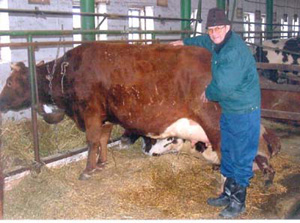You are here » Home » Telling Our Story
First Person
USAID helps Russian company adopt successful breeding & management practices
Collaboration Improves Russian Dairy Industry

Photo: Nadezhda Kozina
USAID Farmer to Farmer volunteer Damon Szymanski checks the condition of a cow at the Bolshoi Beisug Village located in Krasnodar, Russia.
Alex Pelikh is the director of Suvorovo Joint-Stock Company which was founded
twenty years ago and produces milk, meat, and grain. Pelikh was not satisfied
with milk yields and wanted to learn more about American approaches to dairy
herd management. He sought help from USAID’s Farmer to Farmer program
which sponsors experts to advise farm groups, agricultural education institutions,
and agribusinesses.
In 2003, Damon Szymanski traveled to Krasnodar, Russia to provide Suvorovo
with assistance. Szymanski, a dairy farmer from Wisconsin, has traveled to
Russia since 1992 as part of USAID’s Farmer to Farmer program administered
by ACDI/VOCA. Farmer to Farmer volunteers provide guidance on various
agricultural issues such as herd management techniques, feed and protein
sources, and sanitation practices, as well as upgrading equipment maintenance,
and adopting refrigerated storage and chilling technologies.
At Suvorovo farm, Szymanski helped to improve feed rations by replacing straw
and feed-beets with more nutritious mixes, and encouraged the company to
adopt better practices for breeding and management. The improved nutrition
enabled the cows to produce more milk. As a result, Suvorovo increased total
milk production by 14.7% as well as its average annual milk yield per milking
cow from 3,500 kg to 4,015 kg, leading to an increase in net revenue for the
company.
Print-friendly version of this page (244kb - PDF)
Back to Top ^
|




